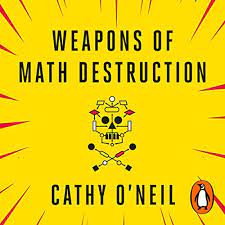
Book Report
Book review of Cathy O'Neil's book 'Weapons of Math Destruction'
INTRODUCTION
“Weapons of Math Destruction” is a critically acclaimed book by Cathy O’Neil, a mathematician and data scientist turned author, that explores how algorithms and models, often used in the name of efficiency and objectivity, can actually reinforce and perpetuate inequality, discrimination, and injustice. O’Neil argues that these “weapons of math destruction” are particularly insidious because they are often opaque and difficult to challenge, leading to serious consequences for individuals and society as a whole. Through a series of case studies, O’Neil reveals how algorithms are used in various fields such as education, criminal justice, and finance, and highlights their impact on vulnerable communities. The book offers an important critique of the growing role of big data and algorithms in our lives and challenges us to rethink the ways in which we use these tools to shape our society.
WHAT IS LIKABLE
One of the likable aspects of “Weapons of Math Destruction” is how Cathy O’Neil explains complex mathematical concepts and algorithms in a clear and accessible way, without sacrificing accuracy or rigor. She uses vivid examples and engaging anecdotes to illustrate how these algorithms can have real-world impacts on people’s lives, making the book both informative and engaging. Additionally, while the book is critical of certain uses of algorithms, O’Neil also offers constructive suggestions for how we can improve our use of data and algorithms to create more fair and just systems. This combination of critique and practical solutions makes the book an empowering read for those who want to understand the risks and potential of the increasingly data-driven world we live in.
WHAT I DIDN’T LIKE
While “Weapons of Math Destruction” is an insightful and thought-provoking book, one potential negative aspect is that some of the stories and examples presented can be quite depressing, sad, and disheartening. O’Neil highlights how algorithms can perpetuate inequality and harm vulnerable communities, and as a result, some readers may find the book difficult to read due to the injustices that are described. However, it could be argued that this emotional response is precisely what makes the book so effective in conveying its message and driving home the importance of responsible data practices. Ultimately, readers should approach the book with an open mind and be prepared to confront some uncomfortable truths about the ways in which algorithms can impact society.
SUMMARY AND MAIN AUDIENCE
The primary audience for “Weapons of Math Destruction” by Cathy O’Neil is anyone interested in understanding the impact of algorithms and big data on society, particularly in relation to issues of fairness, accountability, and justice. This includes policymakers, academics, data scientists, and the general public who are concerned about the ways in which algorithms can perpetuate inequality and discrimination. The book is written in a clear and accessible style, making it suitable for both technical and non-technical readers. Additionally, the book could be particularly useful for those working in fields where algorithms are used, such as education, criminal justice, and finance, as it offers a critical perspective on the potential risks and unintended consequences of these tools. Overall, “Weapons of Math Destruction” is a compelling read for anyone interested in understanding the role of algorithms in our society and how we can use data responsibly to create more equitable systems.
MY RATING
3/5 STARS - This book made me really depressed about the future of not only society as a whole, but in my personal future as a female graduating from college who struggles with mental health and is looking for a job.